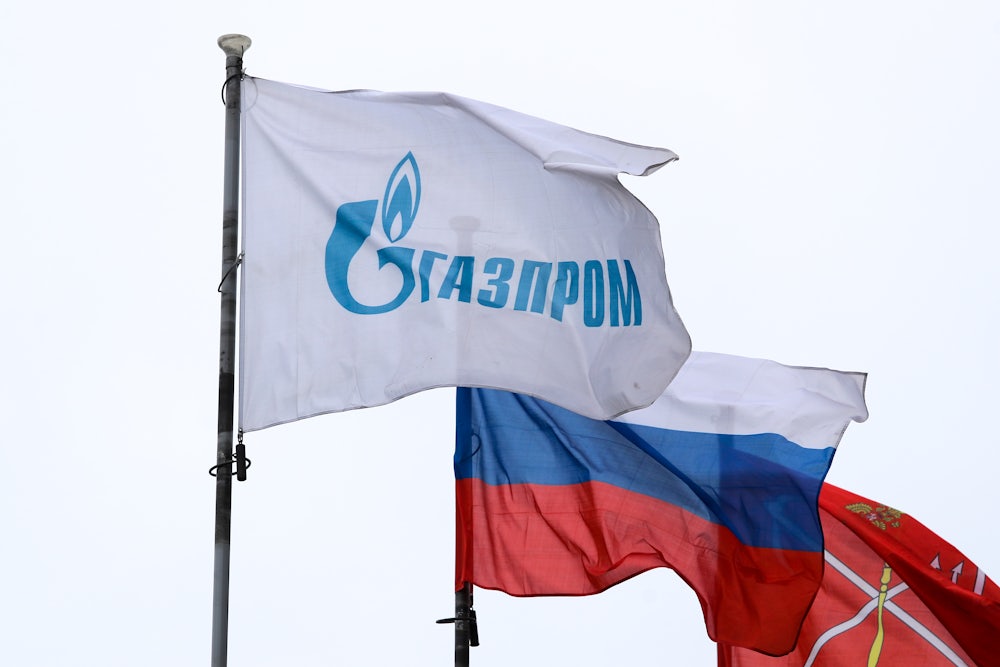Proposals to ban Russian oil imports are beginning to garner bipartisan momentum, with the White House slowly warming up to the idea despite concerns about rapidly rising oil prices.
After senators failed to coalesce around a deal on sanctions ahead of the invasion—an ultimately unnecessary step, given that President Joe Biden had unilateral capabilities to impose sanctions—lawmakers across the ideological spectrum have begun to signal their support for banning U.S. imports of Russian oil. Crucially, the idea has support from congressional leaders; Speaker Nancy Pelosi said last week that she supported banning imports of Russian oil. In a letter to Democratic colleagues on Sunday, Pelosi said that “the House is currently exploring strong legislation that will further isolate Russia from the global economy.”
“Our bill would ban the import of Russian oil and energy products into the United States, repeal normal trade relations with Russia and Belarus, and take the first step to deny Russia access to the World Trade Organization. We would also empower the Executive branch to raise tariffs on Russian imports,” Pelosi said. A bipartisan group of lawmakers introduced a bill to ban Russian energy imports and suspend normal trade relations with Russia and Belarus on Monday.
Meanwhile, a different bipartisan group of senators introduced legislation to ban U.S. imports of Russian oil last week. It would declare a national emergency, directing the president to ban U.S. imports of crude oil, petroleum, petroleum products, liquefied natural gas, and coal from Russia. This bill picked up support from Senator Dick Durbin, the Democratic majority whip, over the weekend. While it was introduced by two centrists—Democratic Senator Joe Manchin and GOP Senator Lisa Murkowski—it also has support from more progressive and more conservative members. Bipartisan companion legislation was also introduced in the House. Separately, Democratic Senator Ed Markey, a progressive, introduced his own legislation last week to ban Russian oil and petroleum imports into the United States, which also has a companion bill in the House.
Despite his vocal concerns about inflation, which is at its highest levels in decades, Manchin has argued that it is worth paying more at the pump if it means putting the squeeze on Russia. “I would gladly pay 10 cents more a gallon,” Manchin said during a press conference announcing his legislation last Thursday. “This is war.”
Global oil prices have already hiked significantly since Russia invaded Ukraine late last month. On Monday, oil prices jumped to $139 a barrel, the highest level in more than a decade. The national average price for gas topped $4 on Sunday, 40 cents higher than it was just last week, according to AAA. Gasoline prices are at their highest since May 2011, per the Energy Information Administration. Biden last week announced that the U.S. and other world leaders had agreed to release 60 million barrels of oil from their strategic reserve in an effort to combat the climbing prices.
Lawmakers also argue that imposing economic sanctions on Russia while allowing for Russian oil and gas imports to continue are principles in conflict. “It’s anathema, I think, to many of us in Congress that while we are sanctioning them and trying to cripple their economy … we would help them in any way by purchasing their petroleum,” Representative Adam Schiff told CBS’s Face the Nation on Sunday.
Initially, the Biden administration seemed cool to the idea, with White House press secretary Jen Psaki voicing the administration’s concerns about rising gas prices. She signaled more openness on Friday, saying, “We are looking at ways to reduce the import of Russian oil while also making sure that we are maintaining the global supply needs out there.”
But Secretary of State Antony Blinken took matters a step further, saying in a Sunday interview on Meet the Press that the U.S. was already in consultation with European allies on a potential ban on Russian oil imports.
“I spoke to the president and the leading members of the Cabinet about this just yesterday from Europe, and we are now in very active discussions with our European partners about banning the import of Russian oil to our countries, while of course at the same time maintaining a steady global supply of oil,” Blinken said. When asked if the U.S. would ban Russian oil “unilaterally,” Blinken replied: “A hallmark of everything we’ve done to date has been this coordination with allies and partners. We are much more effective across the board.”
Russia earned around $63 billion from international oil and gas exports in the third quarter of 2021, the last period for which data is available. Although the U.S. imports less than 10 percent of its oil from Russia, banning oil imports could provide an important signal for global markets and put pressure on other countries to do the same.
“It’s easy to do, it won’t make much direct impact [on the U.S.], but it will be heavily laden in the symbolism of the United States saying, ‘We’re willing to … take on this additional cost,’” said Yuval Weber, a global fellow at the Wilson Center and research assistant professor at the Bush School of Government and Public Service at Texas A&M University, about the possibility of banning Russian oil imports. “This would provide, basically, a signal or symbol of additional pressure on other states to restrict their purchases of Russian oil and oil products. And that would be much more harmful or damaging to Russia’s ability to continue funding itself.” While it could take days or weeks for the impact of a ban to hit Russia, Weber said, “market players would take that signal that if the United States does something, everyone else is going to follow.”
But Europe is far more dependent on Russian oil than the U.S., and leaders in Germany and Hungary indicated on Monday that they could not support bans on energy imports. However, even that thinking is clearly evolving. Germany, which relies heavily on Russian oil imports, formally suspended approval of the Russian-owned Nord Stream 2 pipeline in late February. U.K. Prime Minister Boris Johnson said Monday that “we have to consider how we can all move away as fast as possible from dependence, reliance on Russian hydrocarbons, Russian oil and gas.” A U.S. ban on Russian oil would only continue to mount pressure.
“For the Europeans, this would be a huge deal. And the underlying commitment that the U.S. made to our European partners in getting them on board with some of the stiffest sanctions the world has ever seen was to make sure that they would have sufficient energy supply,” said Daniel Silverberg, an adjunct senior fellow at the Center for a New American Security. He highlighted that the same week that Congress pressed forward with legislation to ban Russian oil imports, the Treasury Department issued updated guidance to authorize transactions with Russian entities for energy supplies. “I think the administration is going to try and buy itself time to increase supply while pursuing the objective of closing off Russian oil and gas to the world,” Silverberg said.
International traders and refiners are already declining to purchase Russian crude oil, in part due to concerns about future sanctions. Shell became one of the few companies to buy Russian crude oil on Friday, snapping up 100,000 metric tons at a discounted price. But there was significant backlash to that decision, and Shell said in a Saturday statement that it would “commit profits from the limited amount of Russian oil we have to purchase to a dedicated fund” and would coordinate with humanitarian agencies to determine how best to use those monies to aid Ukrainians.
Samantha Gross, the director of the Energy Security and Climate Initiative at the Brookings Institute, said that the political toxicity of purchasing Russian oil is already reflected in higher gas prices. “To some extent, refiners are saying no to Russian oil already. It doesn’t mean nothing would happen if it were banned entirely, but it does say that we’re seeing some of the impact we might see already,” Gross said.
There are concerns about what the impact on the climate would be if the U.S. and other countries begin banning Russian oil imports. But Senator Rob Portman argued in the press conference last week that the U.S. would be more environmentally conscious in producing oil than Russia is. “Who thinks that Russian oil is being produced in a more environmentally sound way than American oil?” Portman said, pointing to the high methane emissions from Russian oil production. “It’s much dirtier in terms of how they produce it, then they’ve got to send it here by ship, which creates a lot of CO2.”
Gross noted that the U.S. could regulate domestic oil production in a way that it cannot monitor international production. “I’m a big believer in, you don’t want to get the U.S. out of the oil production business until we get out of the oil-consuming business,” she said. “The fact that we’re producing it here may not be such a bad thing compared to the other alternatives, because we can monitor the production and know what’s going on. We know we can regulate it well.”
But Gross also said that a ban on Russian oil imports could provide a geopolitical argument for why a transition to clean energy is necessary. “This is a really in-your-face demonstration of the geopolitical implications of continuing to rely on oil.”
This echoes an argument made by Democratic Senator John Hickenlooper on Thursday. “It’s going to accelerate the transition we’re already seeing into sun-driven energy, water-driven energy; that acceleration is only going to help make us more independent in these types of situations,” Hickenlooper said.
In a tweet on Saturday, Hawaii Senator Brian Schatz repeated these sentiments, saying, “The free world has short term fuel and energy needs and for now that means finding non Russian oil and gas. But let’s be clear—the way to leave all of these thugs in the dust is to just, collectively, globally, say, enough already. Clean energy is the future.”
Some experts argue that it is possible to reduce Russian oil sales while limiting the negative effects on the global market. Edward Fishman, a former Obama-era State Department official and an adjunct fellow at the Center for a New American Security, wrote on Twitter that the U.S. and Europe could adopt a similar model to how they confronted Iran in the early 2010s. Buyers of Iranian oil were permitted to continue purchasing it, as long as they “significantly reduced” their imports. Proceeds from these sales could only accrue in Iranian-owned escrow accounts in third countries, meaning that they could only be used for bilateral trade and not go back to Iran to fund terrorist activity.
“This phased reduction strategy would deprive the Kremlin of billions without shocking global oil markets. It would give a strong market signal to other producers to compensate for diminishing Russian cargoes. It would cut Putin’s cash flows at their source,” Fishman argued.
It’s too late to deter Putin, who is nearly two weeks into an invasion that has yet to yield his desired results of regime change in Ukraine. Gross said that the impact of a ban on Russian oil imports might not affect Putin’s decision-making in the immediate term, but it would continue to put pressure on him.
“Putin is going to Putin,” Gross said. “And there’s not much we can do to change his attitude or his way of thinking. But what we can do is make it really, really painful.”










